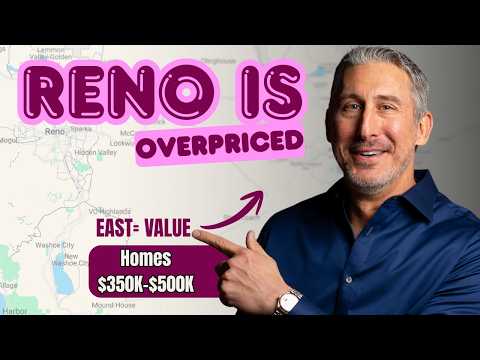View Quick Summary
Curious about Reno, Nevada?
- Reno isn't as cheap as you might think.
- Consider short-term renting if you're new.
- Utilities remain affordable versus the West Coast.
- Taxes and insurance can be surprising.
The Real Cost of Living in Reno: Beyond Just Housing Prices
The cost of living conversation in Reno, Nevada, is one that never seems to go out of style. Everyone has an opinion. Some think we’re a budget-friendly escape from California, while others argue that it’s not as affordable as it used to be. What’s the truth? As someone who’s lived in Reno for over 30 years, raised a family here, and worked with hundreds of people relocating from out of state, I can tell you, there’s more to affordability than just home prices.
Let’s walk through the full picture: housing, utilities, insurance, taxes, transportation, and even lifestyle expenses. By the end, you'll understand what your monthly budget in Reno might realistically look like, and whether Northern Nevada is the right fit for your lifestyle.
Housing: The Biggest Piece of the Puzzle
Let’s not sugarcoat it, housing is likely going to be your biggest expense if you decide to move here. Whether you’re buying or renting, prices are higher than many people expect. We often get calls from folks relocating from California saying, “Hey, Reno looks affordable!” And then they arrive and realize, wait a minute, this isn’t the bargain I thought it would be.
The truth is, Reno and Sparks have seen significant appreciation over the last decade. Home prices have climbed, driven by demand, job growth, and our proximity to California. You can still find good value, especially if you're open to surrounding areas like Fernley or Dayton, but if you're focusing on central Reno or South Reno neighborhoods like Arrowcreek or Damonte Ranch, prepare your wallet.
For renters, it’s much of the same story. Rentals are competitive and prices can be surprisingly steep, especially for newer buildings or properties with amenities. That said, renting can be a great short-term strategy while you learn the area and decide where you really want to plant roots.
Pros and Cons of Renting Versus Buying
- Buying: Builds equity, locks in housing costs long-term, but comes with higher upfront costs and maintenance responsibilities.
- Renting: More flexible, lower upfront costs, but less stability in monthly rent over time.
Quick Tip: If you're shopping for a home here, remember to budget beyond just principal and interest. You’ll need to factor in taxes, insurance, HOA fees, and ongoing maintenance. First-time buyers often overlook these and end up surprised when the true monthly cost hits.
The Insurance Breakdown: What You'll Pay and What to Watch For
Insurance is another major category we coach people on. Whether it’s homeowners insurance, auto, or healthcare, costs can vary widely depending on your specific situation.
Homeowners Insurance
In general, home insurance in Reno is pretty reasonable, unless the property is in a high-risk area like wildfire zones or flood plains. Some homes near forested areas or in high-elevation neighborhoods might require additional coverage, such as wildfire or flood insurance. We're not talking Orange County prices here, but it definitely affects your monthly affordability.
Auto Insurance
Auto insurance tends to track with national averages. A young single person in their twenties with a newer car might pay close to $130 per month. That could be lower or higher depending on your driving history and the vehicle.
Healthcare
If you’re self-employed like many of us are, healthcare can be a significant monthly cost. Employer-sponsored coverage will obviously make your expenses lower. While quality and access here in Reno are solid for basic care, things can start to vary widely if you need specialty care or ongoing treatments.
Utilities in Reno: What the Bills Really Look Like
When it comes to utilities, Reno offers some welcome relief. In general, our utility bills are affordable compared to many larger cities, especially those on the West Coast.
What You Can Expect
- Water: Charges are seasonal; winter bills are minimal while summer irrigation pushes it higher, think $20, $100/month range depending on landscaping.
- Electricity: Averages between $60 to $100 monthly in most single-family homes, depending on HVAC usage.
- Trash and Sewer: Typically bundled by service providers; expect $40, $60/month total in most cases.
- Internet: Around $70, $100/month depending on the provider and speed.
Some apartment complexes simplify life by offering utilities as part of a flat-fee rent structure, especially for water, sewer, and garbage. One of our team members mentioned a friend paying just $75/month total for every utility. Those all-in deals are great if you can get them.
Taxes: Lower in Some Ways, Confusing in Others
One of Reno’s most attractive financial perks: no state income tax. That’s a huge draw for anyone coming from California, Oregon, or other high-tax states. But there’s still property tax and sales tax to consider.
Property Taxes
Unlike in California where taxes are based on your purchase price, in Nevada, property tax values are tied to the year the home was built and assessed. Newer homes typically have higher property taxes, even if they’re the same sales price as a much older home.
There’s also a cap on how much tax can increase each year (usually 3 percent for primary residences, sometimes more for investment properties). It’s a different model, and why two neighbors with similar homes might be paying very different tax amounts.
Sales Tax
Expect sales tax in Washoe County (where Reno and Sparks sit) to be around 8.265 percent. It’s not peanuts, but still lower than many high-sales-tax cities in California.
Transportation Costs: Gas, Maintenance, and Car Culture
Reno is a car town. Yes, we have a bus system, but if you want to get around easily, especially from outlying neighborhoods like Spanish Springs or South Reno, you’ll need a vehicle.
Gas prices are higher than you might expect. Part of that is because gas taxes fund our road work, which honestly, is why our roads are in pretty good shape. But if you’re used to three-dollar gas back east, be ready for a small sticker shock here.
Quick anecdote: One of our team members just got back from Pennsylvania where gas was under $3 a gallon. Here in Reno? Closer to $4, especially for diesel drivers. But the tradeoff? No potholes for days. Californians especially comment on how smooth our roads are, so at least we're getting something for that added cost.
Vehicle Registration
Compared to California, it’s moderate. But if you register a brand-new car, don’t be surprised if the bill is higher than you expected. A new car will run you significantly more compared to a 10, 15-year-old model. For instance, a 15-year-old car registration might be as low as $117 annually.
Lifestyle Costs: From Entertainment to Your Weekly Grocery Bill
This is where things get a bit more personal, it all depends on how you live your life. For me, lifestyle is skiing in winter and a few rounds of golf in summer. For one of our team members in their twenties, it’s more about dinners out, catching a drink with friends, and hitting concerts downtown.
Dining and Entertainment
Sitting down for a casual dinner or grabbing a beer with friends isn’t outrageously expensive here, but it’s also not small-town cheap. One of the funnier comparisons came from someone who used to live in Montana. In Missoula, happy hour meant $2 beers. Here? Expect to pay $6 and upwards. Not a deal-breaker, but definitely something to note if you’re used to big-time bang-for-your-buck bar scenes.
Grocery Costs
Basic groceries are fairly consistent with other Western cities. Definitely cheaper than places like San Francisco or Seattle. If you’re coming from the Midwest or Southeast, certain items, hello, produce and meat, might feel a bit high. But overall, it’s manageable.
Premium Neighborhoods and Those Hidden Extras
If you're moving into a more upscale neighborhood like ArrowCreek, Montreux, Somersett, or Caughlin Ranch, be aware that HOA fees come with the territory. These neighborhoods often include community pools, golf courses, landscaping maintenance, and security, which are funded through monthly or annual dues.
And if you're looking at condos or townhomes, HOA fees can be even higher, sometimes approaching $300, $500 per month. It might make more financial sense to find a modest home with a low annual HOA and hire your own lawncare or housecleaning help as needed.
Final Thoughts: Is Reno Affordable For You?
Here’s the honest truth, Reno, Nevada is not a secret bargain anymore. But it is a vibrant, growing community with a high quality of life, excellent outdoor access, a relatively stable economy, and no state income tax, all of which make it an appealing option for many families.
Biggest takeaways:
- Housing isn’t cheap, but it’s more attainable than in many California cities.
- Utilities and insurance are very manageable here.
- Don’t overlook taxes, lifestyle, or transportation when budgeting.
If you’re planning a move and trying to learn more about what neighborhoods fit your family or lifestyle best, reach out to us. We’ve helped hundreds of families make the move with confidence. And if you’re just starting your research stage, be sure to check out the channel for more cost of living videos like this one, or explore other posts for even deeper dives.
Frequently Asked Questions
Frequently Asked Questions
Discover more about what it's like to live in Reno and how to prepare. We've answered some common questions below.

Need Help?
Ready to make your move to Reno?
Contact us today to navigate Reno's costs effortlessly, ensuring a seamless move with expert insights and reliable guidance.


